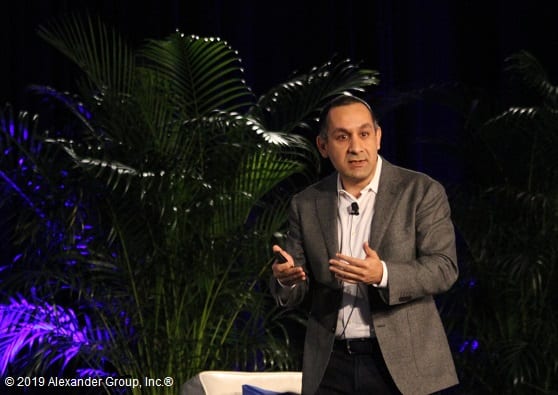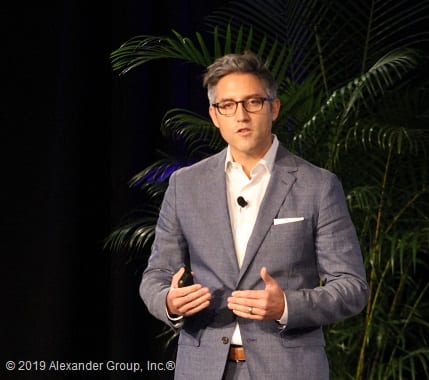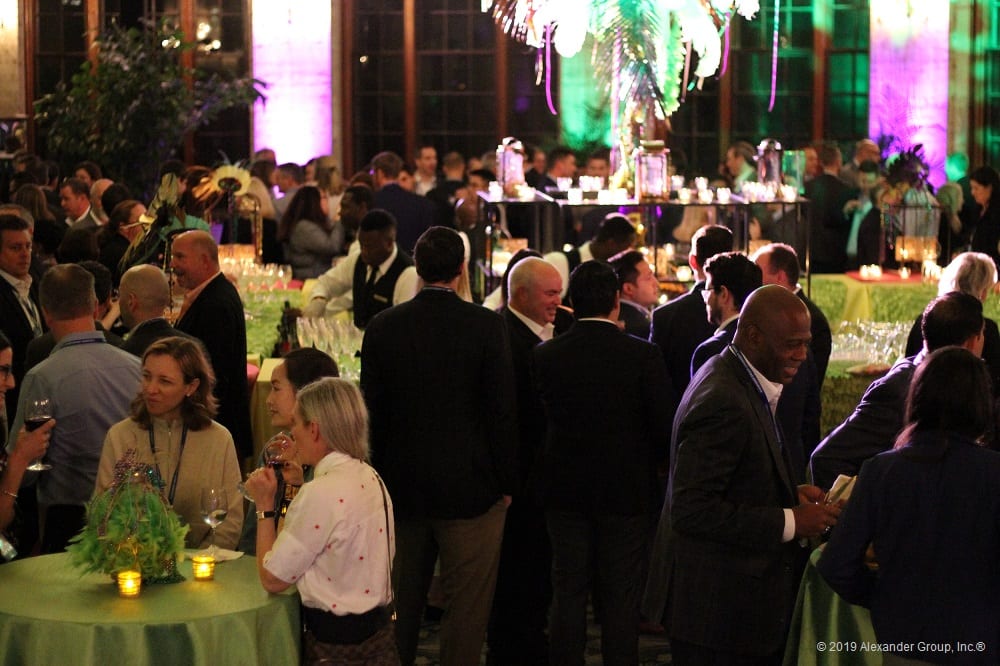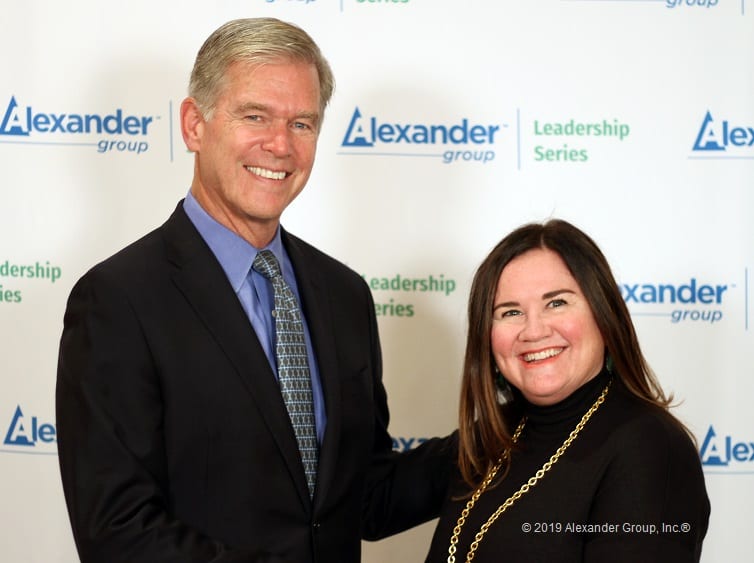
Aamir Paul, Country President US, Schneider Electric
Attendees at this year’s Executive Forum in Palm Beach, Florida shared a common reality: The majority of today’s companies are in some stage of transformation and face similar challenges in managing and executing that change. 300+ cross-industry senior revenue, sales and ops executives joined Alexander Group practitioners for three insight-packed days of transformation stories, networking, shared experiences and actionable takeaways. How can revenue leaders apply the four growth multipliers of Culture, Coverage, Talent and Tools to navigate today’s dynamic landscape and successfully take control of the revenue engine? Speakers had much to say.
While companies are struggling to embrace digital and build a sustainable revenue ecosystem, challenges are ever-present. Speakers at the Executive Forum tackled topics around changing buyers, disparate buyer journeys, prioritizing investments for engagements and enablement, moving from sales ops to revenue ops, keeping pace with customer innovation, aligning sales compensation, changing roles and millennial workers, Customer Success, creating new corporate cultures and, of course, revenue growth.
As Lori Tierney (VP Commercial Ops N.A., J&J MD&D) noted, “Everyone is excited about Digital, but no one knows why.” While companies may not know why, they certainly are learning how to transform from the bottom up (and sometimes top-down) to meet the demands of today’s customers who have embarked on a more informed, more demanding customer journey.

Aamir Paul, Country President US, Schneider Electric
The importance of defining and embracing a company culture was a common theme. At Schneider Electric, Aamir Paul (President U.S.) notes they defined their company culture three years ago as they began their GTC model transformation. Using an outside-in view, they keep the customer top-of-mind, dare to disrupt, embrace diversity, aspire to learn every day, have an energy sustainable POV and have invested in the right training and tools. Today they measure their leaders against how well they champion this culture.
Jay Barrows (CCO, GE Healthcare Digital) echoed the importance of culture in his keynote address. “Culture and mindset is key to unlocking digital.” At his company, that means, in part, building a Customer Engagement model for breaking down silos, including a Customer Success component to help shift mindset from just selling to customer intimacy and identifying and leveraging team capabilities.
One session, Culture Eats Strategy for Lunch, featured a panel of revenue leaders who focused on the role culture plays in organizations. Culture supports organizations through change, in driving a mission-driven focus and in creating deeper understanding of customer needs. Most companies need to shift culture to be more customer driven (Sal Patalano-Chief Revenue Officer at SilverSky).

John Hanna, Chief Commercial Officer, Veracyte
Adding to this, John Hanna (CCO, Veracyte) pointed out the need to harmonize strategy and culture. By deploying sales teams that specialize in products, they build a high-energy culture that celebrates the unique solutions that their products deliver to the market. They hire professionals in the med tech space (half of which can relate their mission to something meaningful in their own lives) and regularly celebrate patients whose lives they’ve impacted. As they introduce new products, maintaining this winning culture is imperative.
At Vevo, they had the added complexity of merging several company cultures as they shifted from a YouTube-centric business to a global distributor and media partnership. Vevo wanted to change the narrative, notes Kevin McGurn (President, Sales & Distribution), to advertisers. They recognized that shifting the culture internally was imperative to that mandate. They combined sales and marketing to execute a customer-centric mission; and return value to music labels and artists. McGurn admits the processes they put in place, while messy, are now scalable.
Another key focus at the Forum was driving Customer Experience/Customer Success. Rajat Mishra posits “it’s not about the product; it’s about the experience.” Cisco recognized the importance of putting the customer at the center of everything; in fact, more than customer-centric, Cisco is customer-obsessed as they aspire to predict what the customer wants. They’re creating new metrics for customer experience and leveraging the best of digital and human skills, all while making sure the partners are along for the journey.
Emmanuel Ligner (President & CEO, GE Healthcare Life Sciences) also noted how at his company every person across the organization has to put the patient at the center of everything they do; this helps shape the revenue ecosystem and the role of the revenue leader at their company.
For Robert Ruelas (VP Americas EUC Sales, VMware), the quest to be more customer-centric starts with improving the employee experience. First listen to employees, be sure their tools and training are current and quickly available from day 1. Give them access to what they need to enable, empower and inspire—and spend more time with customers. Improved employee experience drives customer centricity.
Bruce Dahlgren (former EVP and CRO, Kony) explored the value of Customer Success (CS). Customer Success brings valuable feedback from the client to the organization. In fact, CS is replacing sales as the “expert” in what customers want and need. It’s not always clear to whom CS should report and it’s important to distinguish between Customer Success and Customer Support with clear rules of engagement.

Networking Reception – Executive Forum
In the Digital Era, companies are rethinking coverage and revenue motions. When everything you do is digitized, according to Beth Ann Vaughn (VP, WW Sales Leader, IBM SaaS), hiring a siloed digital team doesn’t make sense—they’re not simply in their own “lane.” Vaughn suggests integrating marketing and launching new sales and marketing roles. New roles may provide differentiated service, freeing more costly resources to engage with new customers.
Kalina Nikolova also advocates blending sales, marketing and service on the way to becoming more customer-centric. “Customer centricity is the only way to stay relevant,” she notes. When you think like the customer, you organize the business differently. In media, today’s empowered customer is quite powerful. They are in charge and they want to be part of the product development. Staying agile can turn a quickly changing landscape into a competitive advantage.
Again and again, speakers and attendees voiced the importance of melding sales and marketing. While there was disagreement around details (e.g., should sales and marketing report to the same person, what should marketing ‘own” and should marketing roles be incented), consensus was clear: harmonize the overlapping charter of sales and marketing (and often service).
At Glassdoor, one way they harmonize these two functions is by orienting around a common revenue goal for the company, according to Kate Ahlering (CSO). Beth-Ann Roberts (SVP Commercial) indicated Harvard Pilgrim uses a common revenue goal to ensure teamwork across functional boundaries. At Rakuten, Paris Loesch (Managing Director, Enterprise Global Clients) says they adopted a model that integrates marketing into the sales organization; currently, marketing books 80% of their sales.

Gary Tubridy (AGI) & Lori Tierney (Johnson & Johnson)
When it comes to tools, less is more. According to Lori Tierney (Johnson & Johnson MD&D), it’s not the tools that are valuable; the value sellers sustain from them is what matters. Similarly, the quantity of data is not important; it’s the quality. What’s important is to put data in the hands of sellers via easily accessible tools to ensure they spend their time efficiently and effectively.
Robert Wagstaff (TripAdvisor) is also cautious about adding new technology to sales teams. He notes that tools do not substitute for process. Companies should be clear on the process for using tools/data and invest only in the technology that supports that process.
These and many more insights gave speakers and attendees much food for thought. As companies continue to unleash the power of digital, they face many challenges and unequaled opportunities to engage their customers and ignite revenue growth.